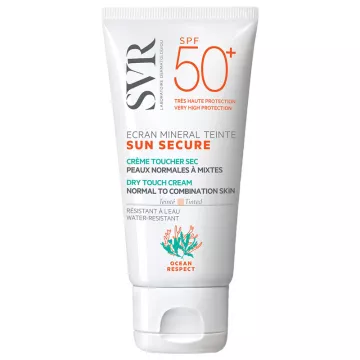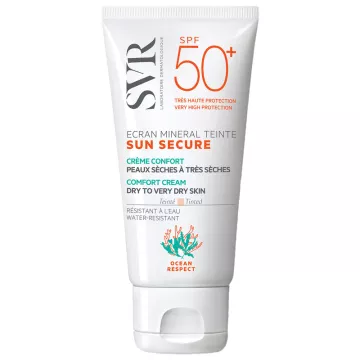

Mineral protection refers to the use of physical filters, such as zinc oxide or titanium dioxide, in sunscreens. Unlike chemical filters, mineral filters act as a physical barrier that sits on the skin and reflects the sun's UV rays. This method of protection is often recommended for sensitive skin, as it is less likely to cause irritation.
Choosing a sunscreen with mineral filters offers several advantages. Firstly, mineral protection is immediate, unlike chemical filters which take around 20 minutes to become effective. What's more, mineral filters are non-allergenic and more respectful of the environment. They are also less likely to disrupt hormones and are recommended for children, pregnant women and people with reactive skin.
To choose a good mineral sunscreen, it's crucial to consider several factors:
For optimum effectiveness, mineral sunscreen should be applied generously and evenly. We recommend applying the cream 30 minutes before exposure to the sun, and reapplying it every two hours, or after swimming, perspiring or using a towel. An insufficient amount of product considerably reduces the level of protection.
Yes, like all skin care products, mineral sunscreens have an expiry date. It's important to check this date before use. An expired sunscreen may be less effective and may not offer the expected UV protection.
Absolutely, mineral sunscreens are often recommended for children because of their gentleness and absence of potentially irritating chemical components. Be sure to choose formulas specially designed to be gentle and safe for children's delicate skin.
Mineral sunscreens are generally well tolerated by most skin types. However, some people may experience reactions if they are sensitive to specific ingredients. It is always advisable to test the product on a small area of skin before applying it widely.
Parabens are preservatives used in many cosmetic products to extend their shelf life. However, they can be a source of health concern, not least because they are suspected of playing a role in hormonal imbalance. Opting for a paraben-free sunscreen is therefore a prudent measure, particularly for people with sensitive skin or frequent users of suncare products.
Sunscreens containing chemical filters, such as oxybenzone and octinoxate, have been linked to the degradation of coral reefs. These substances can contribute to coral bleaching and the disruption of marine ecosystems. Mineral sunscreens, which do not contain these chemical compounds, are considered safer for aquatic environments. They are a preferred alternative for environmentalists and watersports enthusiasts.
UVA and UVB are two types of ultraviolet rays emitted by the sun. UVB is mainly responsible for sunburn and superficial skin damage, while UVA penetrates deeper, causing long-term damage such as skin aging and skin cancer. A good mineral sunscreen should offer broad-spectrum protection, i.e. it should protect effectively against both types of rays, ensuring complete defense.
Yes, mineral sunscreens can and should be used on the face to protect the skin from the harmful effects of the sun. To avoid the whitening effect characteristic of physical filters, we recommend choosing tinted or micronized formulations. These formulations are specially designed to minimize the visibility of particles on the skin, while providing effective, aesthetic protection.
Mineral sunscreens are fully compatible with make-up. In fact, they can be used as a protective base before applying make-up. For best results, apply the sunscreen, leave it to absorb for a few minutes, then apply your make-up as usual. Some mineral sunscreens are even formulated to act as a make-up base, improving the adhesion and durability of your make-up.